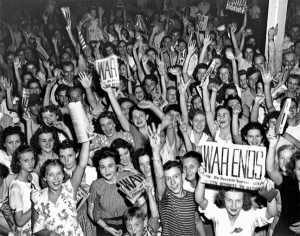75 years ago, the world sighed in relief. After six gruesome years and over 70 million lost lives, World War II was finally over. May 8, 1945, marked both the end of a ruthless regime and the war in Europe. The Allied Forces had brought the German Wehrmacht to its knees, and at 11:01 p.m., the war in Europe was officially over. In the U.S. and the UK, the day is celebrated as “Victory in Europe Day,” and for decades, May 8 (and in some cases May 9) has been a holiday in various European countries – but not in Germany. However, for its 75th anniversary, the Day of Liberation has been declared a one-time holiday in Berlin.
Despite its historic significance, the date received relatively little recognition in the post-war Federal Republic of Germany. In the 1950s and 60s, many wanted to forget, to only look ahead. And surely, there were revisionist sentiments among some German politicians who refused to shed too much light on May 8, and some of them may have thought of it as a day of defeat rather than a day of liberation. May 8 marked not only the end of the war, but also the end of German crimes against humanity, unfathomably atrocious in nature and number.
And yet, it was not until the 1980s that West German politicians began to publicly speak of May 8 as the “day of liberation.” Starting in the 2000s, the day was declared a commemoration day in some federal states. The GDR, however, was more eager to celebrate: Already in 1950, Germany’s Eastern half had declared May 8 a national holiday with annual festivities honoring mostly the Soviet war effort. Does this mean the West wanted to deny and forget while the East was more open about its past? I’d call such a conclusion rushed and unwise; actually, one could even argue for the opposite: it’s much easier to celebrate than to contemplate. And by so fervently celebrating one’s own liberation right after it occurred, it might become all too tempting to consider oneself a mere victim of the past, shunning all notions of personal and collective responsibility.
Speaking of easy: It’s easy for me to say, yes. In the post-war era, it must have been a colossal challenge for all Germans to truly take responsibility for what had happened, to ask oneself what one could have done. Maybe the way both German states dealt with the significant date of May 8 represents the gradual shift in German commemorative culture – from wanting to deny and forget to being able to reflect and process.
I do believe it’s a good thing that May 8 is a holiday in Berlin this year. Today, we have enough distance to reflect on our past as Germans, and as that distance keeps getting bigger, we need to make sure not to forget. It’s crucial to draw attention to that day 75 years ago that shaped the world as we know it today: to commemorate and honor the sacrifices hundreds of thousands had to make to liberate Germany, Europe, and the world from unspeakable evil. To mourn lives lost on all sides. Whether one lives in Berlin or not, celebrating May 8 needs to happen along with mindful remembrance and clarity about historic responsibility.
22,761 Total Views, 3 Views Today







